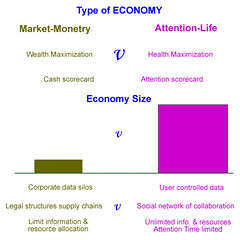Wednesday, September 20, 2006
Tuesday, September 12, 2006
social network beats search every time?
If there were only a choice between using my social network or a search engine to find a bit of information, for me the social network wins every time.
We are just at the very beginning of the creation of social networks online but combined with off line networks, whether it be looking for somewhere to stay or the right venture capitalist, social networks have proved the best results for me.
Of course the reality is that the social network and search and deeply intermixed and one without the other would be see a world with poorer information.
Watch out for impressive new social networking services, they are going to continue to be everywhere.
We are just at the very beginning of the creation of social networks online but combined with off line networks, whether it be looking for somewhere to stay or the right venture capitalist, social networks have proved the best results for me.
Of course the reality is that the social network and search and deeply intermixed and one without the other would be see a world with poorer information.
Watch out for impressive new social networking services, they are going to continue to be everywhere.
collaboration is the new competition
How many times have we heard economist to policitians espoucing that competition is the key influencer in keeping markets efficient and staving off monopoly tendencies. The classic story being how if a market is producing excess profits then that will encourage new market entrants in to share in those profit but the net effect is that prices lower and thus all end consumers benefit.
That is the economics of the market driven economy, the economics of the 'attention' economy will see collaboration as the new competition mantra by the attionomists and policitians. How will that story go?
An individual demands a new service. The current flow of service has never been asked for that service before, those with the skills and talents contribute to that new service by offering up their time. The service is delivered. Other individuals are inspired by the new service and add their demand. The colloborators devote more of their time to this new service. However, demand keep coming and it's not a mass flow for homogeneous service, these are individual, personalized service demands, new iterations or even new evolutions of the original. The existing collaborators can not serve all the demand, attention pricing does not increase because new collaborators enter to serve the demand, (time will have allowed for retraining of skills and automation of key limiting factors now in the new service creation) and all individuals receive the service they require.
That is the economics of the market driven economy, the economics of the 'attention' economy will see collaboration as the new competition mantra by the attionomists and policitians. How will that story go?
An individual demands a new service. The current flow of service has never been asked for that service before, those with the skills and talents contribute to that new service by offering up their time. The service is delivered. Other individuals are inspired by the new service and add their demand. The colloborators devote more of their time to this new service. However, demand keep coming and it's not a mass flow for homogeneous service, these are individual, personalized service demands, new iterations or even new evolutions of the original. The existing collaborators can not serve all the demand, attention pricing does not increase because new collaborators enter to serve the demand, (time will have allowed for retraining of skills and automation of key limiting factors now in the new service creation) and all individuals receive the service they require.
Tuesday, September 05, 2006
the average paradox
The clothes manufacturers and retailers produce piles of the same products. Given this mass homogeneous economy I do find it interesting to observe that on any given day the individual choices produce no to same outfit next to one another on the streets. I call this the average paradox.
Subscribe to:
Comments (Atom)

